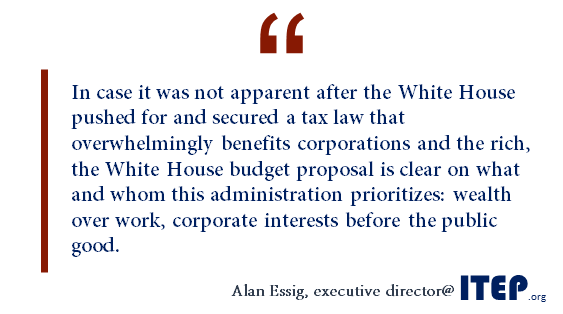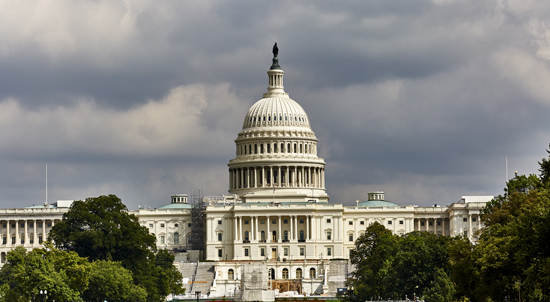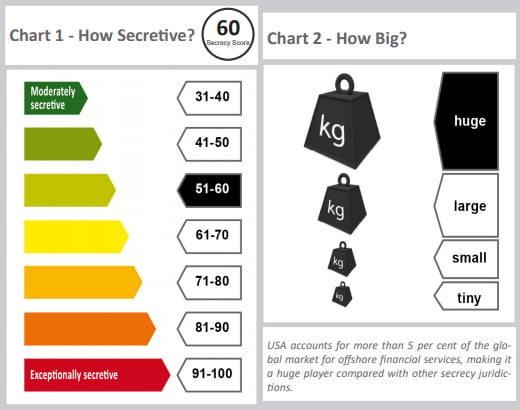
ITEP's Research Priorities
Mnuchin’s Not So Grand Stand on the Carried Interest Loophole Explained
February 15, 2018 • By Matthew Gardner

When President Trump released the initial outline of his tax reform plan in April, carried interest repeal was nowhere to be found. And when Congress hammered out a tax plan in late December, lawmakers agreed to reduce the cost of the carried interest tax provision by about 5 percent. (Full repeal would have raised $20 billion over a decade; the enacted provision raises about $1 billion.)
Kansas Center for Economic Growth: New KCEG Blog Series Documents Equity Issues Facing Kansas
February 15, 2018
systemic barriers facing Kansans can strengthen our state’s economy. Using data broken out by race and ethnicity, gender, and immigration status, the entries highlight areas for policymakers to address to ensure continued economic prosperity for every Kansan. Policy and research analyst Emily Fetsch examined data in recent reports from the Kansas Health Institute and the Institute on Taxation and Economic Policy.

This Valentine's week finds California, Georgia, Missouri, New York, Oregon, and other states flirting with the idea of coupling to various components of the federal tax-cut bill. Meanwhile, lawmakers seeking revenue solutions to budget shortfalls in Alaska, Oklahoma, and Wyoming saw their advances spurned, and anti-tax advocates in many states have been getting mixed responses to their tax-cut proposals. And be sure to check out our "what we're reading" section to see how states are getting no love in recent federal budget developments.
A Gas Tax Hike Is the Obvious Answer to Infrastructure Funding
February 14, 2018 • By Steve Wamhoff

As part of his budget plan released Monday, President Trump offered an infrastructure proposal that he describes as a $1.5 trillion 10-year surge in infrastructure investments. The details of the proposal explain that the federal government would put up only $200 billion of this total, which the administration claims will be offset with cuts in other spending. Even this relatively meager funding amount is illusory because it would clearly be financed by cutting other federal spending — including infrastructure investments.
GOP Dilemma: Love the Tax Cut, Hate the Agency that Administers It
February 14, 2018 • By Matthew Gardner

The president’s budget proposal would cut the agency’s baseline funding from $12 billion to $11.1 billion this year. This is almost a quarter less, in inflation-adjusted terms, than the $14.4 billion the agency received in fiscal year 2010. Not surprisingly, the long, steady decline of IRS funding during this period has led to a reduction in staffing: the agency’s 2016 employee total of 77,000 was 17,000 lower than at the beginning of the decade.
New Jersey Policy Perspective: Op-Ed: How to Counter the GOP Tax Plan with Bold Action
February 14, 2018
The new federal tax law has generated a lot of press, sparked a fair amount of outrage and led many elected officials scrambling to respond with sound policies. Unfortunately, there seems to be widespread confusion about the winners and losers under the new law – confusion that is complicating efforts to clean up New Jersey’s tax code and raise new resources to invest in critical public services.
Amazon Inc. Paid Zero in Federal Taxes in 2017, Gets $789 Million Windfall from New Tax Law
February 13, 2018 • By Matthew Gardner

The online retail giant has built its business model on tax avoidance, and its latest financial filing makes it clear that Amazon continues to be insulated from the nation’s tax system. In 2017, Amazon reported $5.6 billion of U.S. profits and didn’t pay a dime of federal income taxes on it. The company’s financial statement suggests that various tax credits and tax breaks for executive stock options are responsible for zeroing out the company’s tax this year.
CNBC: Trump’s Budget May Delay Future Tax Refunds
February 13, 2018
The president released his budget Monday for fiscal 2019, proposing $11.1 billion for the Internal Revenue Service, including $2.3 billion for tax filing and compliance applications and $110 million to modernize the agency’s computer systems. “The real question is whether the base level of funding will be sufficient for the IRS to do its job […]
Two Months after Top-Heavy Tax Cuts, Trump Budget Proposes “Savings” by Making Cuts to Safety Net Programs
February 12, 2018 • By Alan Essig

“In case it was not apparent after the White House pushed for a tax plan that overwhelmingly benefits corporations and the rich, the White House budget proposal is clear on what and whom it prioritizes: wealth over work, corporate interest before the public good.”
The More Things Change: PG&E Records a Tenth Straight Year of No Federal Income Taxes
February 9, 2018 • By Matthew Gardner

In the runup to last fall’s tax debate, it was commonly observed that corporate tax reform is both easy and hard: the easy part is cutting the rate, and the hard part is paying for it by closing loopholes. The real test of Congress’ determination to achieve tax reform would be whether they would stand up to corporate lobbyists and shut down loopholes like accelerated depreciation that allow profitable companies to pay little or no income tax. As is now widely known, Congress was not especially determined: lawmakers aggressively cut the corporate rate from 35 to 21 percent, but then…
How the Latest Budget Deals Expose the Failure of “Tax Reform”
February 9, 2018 • By Richard Phillips

If there was one thing that tax reform legislation was supposed to accomplish, it was to put an end to the scandalous semiannual ritual of extending and expanding the list of the temporary provisions in the tax code, known as tax extenders. During the passage of the last tax extenders bill at the end of December 2015, lawmakers on both sides of the aisle agreed that it was critical to have a tax code that provides “permanency and certainty” and to move forward with comprehensive tax reform that would decide the fate of the extenders once and for all. Unfortunately,…
State Rundown 2/8: State Responses to Federal Bill Gaining Steam
February 8, 2018 • By ITEP Staff

Several states this week are looking at ways to revamp their tax codes in response to the federal tax cut bill, with Georgia, Idaho, Maryland, Nebraska, and Vermont all actively considering proposals. Meanwhile, Connecticut, Louisiana, and Pennsylvania are working on resolving their budget shortfalls. And transportation funding is getting needed attention in Mississippi, Utah, and Wisconsin.
Vice News: The Trump Tax Cut Isn’t Trickling Down to Workers
February 7, 2018
That all added up to a massive PR campaign on behalf of the cuts that elided all of the bill’s negative consequences, like the decision by Kleenex maker Kimberly-Clark to use its tax windfall to fund a plan that included laying off 5,000 workers. And it’s not clear that the cut directly led to the […]
Kansas Center for Economic Growth: New American immigrants in Kansas strengthen the economy
February 7, 2018
A recent report from the Institute of Tax and Economic Policy (ITEP) shows how undocumented immigrants in Kansas demonstrate their commitment to our state and increase state revenue through the taxes they pay. Read more here
Kansas Center for Economic Growth: New American Immigrants in Kansas Strengthen the Economy
February 7, 2018
Currently, undocumented immigrants residing in Kansas pay nearly $68 million a year in state and local taxes. By granting undocumented immigrants full and legal status, Kansas could receive an additional $11 million in state and local taxes annually, creating a nearly $79 million state and local tax contribution from the undocumented immigrant population. Read more […]
Idaho Center for Fiscal Policy: Analysis of House Bill 463
February 6, 2018
One motivation for reducing taxes this year is to offset the increase in revenue that conformity – aligning our state tax code with recent federal changes – will bring. If Idaho chooses to conform, the state will collect additional revenue in the range of $82 million to $97.4 million. This means that some Idahoans – particularly those with multiple children - will pay more in state taxes.
How Much Will Typical Middle-Class Workers Really See Their Paychecks Change?
February 3, 2018 • By Steve Wamhoff

The campaign by Republican leaders in Congress to promote their new tax law has two prongs. One is the claim that corporate income tax cuts are already trickling down to workers, which, as we have explained, is believed by basically no economists anywhere. The other prong of their campaign is to argue that the personal income tax cuts will provide a noticeable decline in withholding from paychecks that middle-class people will notice soon. At this point, it’s helpful to look at some actual data and see how small the boost in take-home pay will really be for most Americans.
Dallas Morning News: Look out N.Y., L.A. and Chicago: The New Tax Law Makes Dallas even stronger
February 2, 2018
Most of the individual and family savings from tax reform are going to high earners. In Texas, three-quarters of the upside will be claimed by taxpayers earning over $106,000, according to the Institute on Taxation and Economic Policy, a “nonprofit, nonpartisan” research firm in Washington. To offset those gains — and the hit on the […]

Sometimes, ranking near No. 1 in the world is not a badge of pride. According to the Financial Secrecy Index released by the Tax Justice Network (TJN), the United States is the second largest contributor to financial secrecy in the world, placing it in the company of infamous tax havens such as Switzerland (ranked No. 1) and the Cayman Islands (ranked No. 3). Financial secrecy is enabling people to hide income from the authorities to evade taxes or financial regulation, launder profits from crime, finance terrorism, or otherwise break the law.
Georgia Budget and Policy Institute: Immigrants Make Georgia Stronger and Better Every Day
February 1, 2018
Immigrant taxpayers contribute to Georgia’s bottom line. As immigrants start businesses, buy homes, earn wages and spend disposable income at local businesses, they generate considerable state and local tax revenue regardless of citizenship status. Undocumented Georgians contributed an estimated $352 million in state and local taxes in 2014, according to the Institute on Taxation and […]
Georgia Budget & Policy Institute: People-Powered Prosperity
February 1, 2018
People-Powered Prosperity details a new vision for how state lawmakers can pursue strategies to help all Georgians thrive, as well as how the state can responsibly pay for it.
